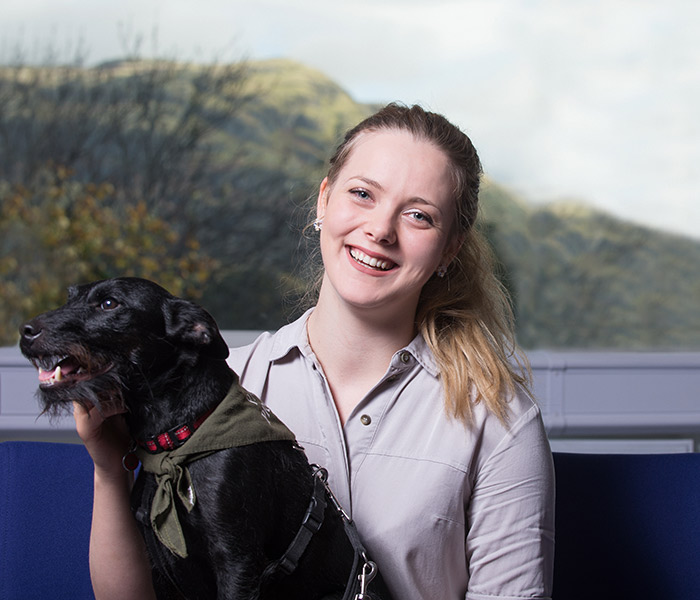MSc / MA Human-Animal Interaction
Learn from our noted experts in human-animal interaction across a wide range of contexts, from pet owning to animal-assisted interventions, zoos, farms and conservation.
Key facts
- Award MA, Masters / MSc, Postgraduate Certificate, Postgraduate Diploma
- Start date September 2024
- Application notes For students who need a visa: we are closed for September 2024 entry.
- Duration MSc full-time: 12 months, MSc part-time: 24 months
- Mode of study full time, part time
- Delivery on campus
Overview
Humans share this planet with other animals and our interactions are at the core of our everyday lives. We farm and eat animals, we keep them as companions and for work, as models for humans in laboratory research, in animal-assisted interventions for positive behaviour change, and in education, entertainment and ecotourism. Depending upon our perceptions and attitudes towards animals, and in relation to the impact they have on us and the environment, we may actively attempt to conserve them, domesticate them or eradicate them.
In this Masters in Human-Animal Interaction you will learn interdisciplinary approaches and a diverse range of methods used to research our relationships with other non-human animal species. The Masters covers a broad range of topics and looks at human–animal interactions across a wide range of contexts – from pet owning to animal-assisted interventions, zoos, farms and conservation.
You'll learn about the importance of both human and animal behaviour in shaping human-animal interaction, and the associated ethical issues, as well as learning to critically evaluate methods for measuring attitudes, interactions and their outcomes.
You'll carry out a practical placement and research project to get direct experience tailored to your individual career goals. You will also learn from our recognised experts in human–animal interaction, whose specialisms include:
- the study of animal behaviour and animal welfare;
- animal-assisted activities and interventions;
- human and animal coexistence.
This Masters course can be studied as an MA or MSc. It depends on whether your focus is on qualitative (MA) methodologies or both quantitative and qualitative (MSc) methodologies. Selected components of this Masters course count as continuing professional development for those already working in this area.
Top reasons to study with us
Work placements
You’ll carry out a placement and research project to gain direct experience tailored to your individual career goals. You may be able to undertake a placement or conduct data collection for your research project at suitable organisations outside the UK.
We have experience in delivering placement modules and we have excellent links with partners in industry and the third sector. Established partnerships with relevant organisations also offer research projects to students.
Flexible learning
If you’re interested in studying a module from this course, the Postgraduate Certificate or the Postgraduate Diploma then please email Graduate Admissions to discuss your course of study.
Faculty facilities
The Division of Psychology has outstanding laboratory space fitted with high-quality equipment. It has excellent computing infrastructure, and both research and teaching activities are supported by in-house technical staff with computing, programming, electronic and audio-video expertise.
Psychology Masters students have access to a dedicated suite of study and teaching rooms.
Research overview
The University of Stirling is rated 2nd in Scotland for research impact in Psychology, Psychiatry and Neuroscience (Research Excellence Framework 2021), with 100% of our research impact and environment rated as world-leading or internationally excellent.
As a postgraduate taught student you’ll be part of our lively research community, meeting up for weekly research seminars and informal specialist discussion groups.
Entry requirements
Academic requirements
A minimum of a second class honours degree (2.1 preferred) or equivalent in a relevant subject. Applicants without these formal qualifications but with significant appropriate/relevant work/life experience are encouraged to apply.
Other routes of entry
If you don't currently meet our academic requirements, INTO University of Stirling offers a variety of preparation programmes that can earn you the qualifications and skills you need to progress onto some of our courses. Explore INTO University of Stirling to see the pathway and pre-masters routes available.
International entry requirements
English language requirements
If English is not your first language you must have one of the following qualifications as evidence of your English language skills:
- IELTS Academic or UKVI 6.0 with a minimum of 5.5 in each sub-skill.
- Pearson Test of English (Academic) 60 overall with a minimum of 59 in each sub-skill.
- IBT TOEFL 78 overall with a minimum of 17 in listening, 18 in reading, 20 in speaking and 17 in writing.
See our information on English language requirements for more details on the language tests we accept and options to waive these requirements.
Pre-sessional English language courses
If you need to improve your English language skills before you enter this course, our partner INTO University of Stirling offers a range of English language courses. These intensive and flexible courses are designed to improve your English ability for entry to this degree.
Find out more about our pre-sessional English language courses.
Course details
Psychology has powerful methods to help inform our interactions with animals. The course provides training in the fundamentals of research methods and how these apply to the study of human animal interactions.
Both MA and MSc students take a module on Qualitative Data Analysis. MSc students also take the Quantitative Analysis Methods in Psychological Research module, but MA students take another module from a range of options (such as Child Development, Autism, Cognition and Neuropsychology).
As noted above, there is an external placement module and an individual research project. The individual module components contribute towards two-thirds of the MA/MSc grade, with the research project dissertation contributing the remaining third.
Students are encouraged to join the Behaviour and Evolution Research Group which meets weekly throughout the semester.
Modules
The module information below provides an example of the types of course module you may study. The details listed are for the academic year that starts in September 2024. Modules and start dates are regularly reviewed and may be subject to change in future years.
Course Details
Teaching
Teaching is delivered in a number of ways, including online materials, tutorials, demonstrations and practical classes, but the majority is seminar-based. Students are typically taught in small groups in specialist classes, or with first year PhD students or other postgraduate students (for example, in modules from other Masters courses).
Assessment
A range of assessment methods are used across the programme, including:
- research proposals
- critical reviews
- a logic model
- reflective journals for placements
- oral presentations
- popular science articles
- dissertation
Course director
Course director
General enquiries
Nicola Cowieson
Fees and funding
Fees and costs
| 2023/24 | 2024/25 | |
|---|---|---|
| Students from the UK and Republic of Ireland | £10,350 | £10,900 |
| International (including EU) students | £21,845 | £22,900 |
University of Stirling alumni will automatically be awarded a fee waiver for the first year of Masters studies through our Stirling Alumni Scholarship.
Applicants from the UK or Republic of Ireland who hold a first-class honours degree or equivalent will automatically be awarded a £2,000 scholarship through our Postgraduate Merit Scholarship.
Fees shown are for a full-time, one-year Masters course.
If you need to extend your period of study, you may be liable for additional fees.
If you are studying part time, the total course fee will be split over the years that you study. The total fee will remain the same and will be held at the rate set in your year of entry.
For more information on courses invoiced on an annual fee basis, please read our tuition fee policy.
Eligible students could receive a scholarship worth between £4,000-£7,000. See our range of generous scholarships for international postgraduate students.
Fees shown are for a full-time, one-year Masters course.
If you need to extend your period of study, you may be liable for additional fees.
If you are studying part time, the total course fee will be split over the years that you study. The total fee will remain the same and will be held at the rate set in your year of entry.
For more information on courses invoiced on an annual fee basis, please read our tuition fee policy.
Postgraduate tuition fee loans
This course is eligible for a postgraduate tuition fee loan from one of the UK’s governments. See the Scholarships and funding section, below, for more details.
Additional costs
There are some instances where additional fees may apply. Depending on your chosen course, you may need to pay additional costs, for example for field trips. Learn more about additional fees.
Scholarships and funding
Funding
Eligible international students could receive a scholarship worth between £4,000-£7,000. See our range of generous scholarships for international postgraduate students.
University of Stirling alumni will automatically be awarded a fee waiver for the first year of Masters studies through our Stirling Alumni Scholarship.
Applicants from the UK or Republic of Ireland who hold a first-class honours degree or equivalent will automatically be awarded a £2,000 scholarship through our Postgraduate Merit Scholarship.
If you have the talent, ability and drive to study with us, we want to make sure you make the most of the opportunity – regardless of your financial circumstances.
Learn more about available funding opportunities or use our scholarship finder to explore our range of scholarships.
Postgraduate tuition fee loans
Scottish students may be eligible to apply to the Students Award Agency for Scotland (SAAS) for loans of up to £11,500 to cover tuition fees and associated living costs.
English students can apply for a loan of up to £12,167 each year as part of the Postgraduate Masters Loan Scheme.
Welsh students can apply for financial support of up to £18,770 as a combination of grant and loan from Student Finance Wales.
Northern Irish students can apply for a postgraduate tuition fee loan of up to £5,500 from Student Finance NI.
Cost of living
If you’re domiciled in the UK, you can typically apply to your relevant funding body for help with living costs. This usually takes the form of student loans, grants or bursaries, and the amount awarded depends upon your personal circumstances and household income.
International (including EU) students won’t normally be able to claim living support through SAAS or other UK public funding bodies. You should contact the relevant authority in your country to find out if you’re eligible to receive support.
Payment options
We aim to be as flexible as possible, and offer a wide range of payment methods - including the option to pay fees by instalments. Learn more about how to pay
After you graduate
The course is designed for those going on to do further research in the field of human-animal interaction. It would also suit those who want to pursue careers where it would be useful to understand the theoretical and practical aspects of this field.
The placement and research project enables you to gain direct experience tailored to your individual career aspirations.
What our students said

Scotland
MSc Human Animal Interaction
Read Kirsty-Marie's storyThis course not only provided me with a place of belonging with friends of like-mindedness but it also provided me with amazing opportunities.

USA
MSc Human Animal Interaction
Read Michelle's storyThe core class, taught by very knowledgeable and accessible professors, allows for much group discussion and self-directed study in topics that interest the individual, as well.

England
MSc / MA Human-Animal Interaction
Read Ellie's storyAll the reading, lectures and discussion was exactly what I was interested in. The idea of animal rights, that humans should respect other species, is quite new really - I learned so much.
